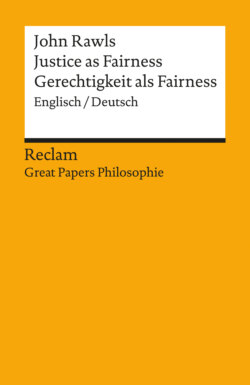Justice as Fairness / Gerechtigkeit als Fairness (Englisch/Deutsch)

Реклама. ООО «ЛитРес», ИНН: 7719571260.
Оглавление
John Rawls. Justice as Fairness / Gerechtigkeit als Fairness (Englisch/Deutsch)
Inhalt
[6]Justice as Fairness1
[7]Gerechtigkeit als Fairness25
[113]Zu dieser Ausgabe
[114]Anmerkungen
[128]Literaturhinweise. Texte von John Rawls. Monographien
Aufsatzsammlungen
Aufsätze
Forschungsliteratur
Weiterführende Literatur
[132]Nachwort
[133]1 Gerechtigkeit als Tugend sozialer Institutionen
2 Die zwei Prinzipien der Gerechtigkeit
3 Rechtfertigung der Gerechtigkeitsprinzipien
4 Verhältnis der Konzeption zur Tradition des Gesellschaftsvertrags
[158]5 Gerechtigkeit als Fairness
6 Bezüge zum Utilitarismus
[163]7 Abgrenzung vom Utilitarismus: das Beispiel der Sklaverei
8 Der Status der Theorie
9 Argumentationsstruktur
[168]1. Annahmen
[169]2. Thesen
3. Plausibilisierung
[172]Zur Person
Fußnoten
Über dieses Buch
Hinweise zur E-Book-Ausgabe
Отрывок из книги
John Rawls
Justice as Fairness
.....
Now if the participants in a practice accept its rules as fair, and so have no complaint to lodge against it, there arises a prima facie duty (and a corresponding prima facie right) of the parties to each other to act in accordance with the practice when it falls upon them to comply. When any number of persons engage in a practice, or conduct a joint undertaking according to rules, and thus restrict their liberty, those who have submitted to these restrictions when required have the right to a similar acquiescence on the part of those who have benefited by their submission. These conditions will obtain if a practice is correctly acknowledged to be fair, for in this case all who participate in it will benefit from it. The rights and duties so arising are special rights and duties in that they depend on previous actions voluntarily undertaken, in this case on the parties having engaged in a common practice and knowingly accepted its benefits.13 It is not, however, an obligation which [60]presupposes a deliberate performative act in the sense of a promise, or contract, and the [180] like.14 An unfortunate mistake of proponents of the idea of the social contract was to suppose that political obligation does require some such act, or at least to use language which suggests it. It is sufficient that one has knowingly participated in and accepted the benefits of a practice acknowledged to be fair. This prima facie obligation may, of course, be overridden: it may happen, when it comes one’s turn to follow a rule, that other considerations will justify not doing so. But one cannot, in general, be released from this obligation by denying the justice of the practice only when it falls on one to obey. If a person rejects a practice, he should, so far as possible, declare his intention in advance, and avoid participating in it or enjoying its benefits.
This duty I have called that of fair play, but it should be admitted that to refer to it in this way is, perhaps, to extend the ordinary notion of fairness. Usually acting unfairly is not so much the breaking of any particular rule, even if the infraction is difficult to detect (cheating), but taking advantage of loop-holes or ambiguities in rules, availing oneself [62]of unexpected or special circumstances which make it impossible to enforce them, insisting that rules be enforced to one’s advantage when they should be suspended, and more generally, acting contrary to the intention of a practice. It is for this reason that one speaks of the sense of fair play: acting fairly requires more than simply being able to follow rules; what is fair must often be felt, or perceived, one wants to say. It is not, however, an unnatural extension of the duty of fair play to have it include the obligation which participants who have knowingly accepted the benefits of their common practice owe to each other to act in accordance with it when their performance falls due; for it is usually considered unfair if someone accepts the benefits of a practice but refuses to do his part in maintaining it. Thus one might say of the tax-dodger that he violates the duty of fair play: he accepts the benefits of government but will not do his part in releasing resources to it; and members of labor unions often say that fellow workers who [181] refuse to join are being unfair: they refer to them as “free riders,” as persons who enjoy what are the supposed benefits of unionism, higher wages, shorter hours, job security, and the like, but who refuse to share in its burdens in the form of paying dues, and so on.
.....